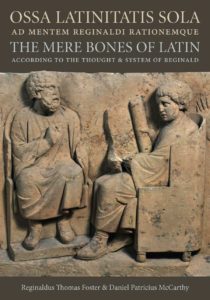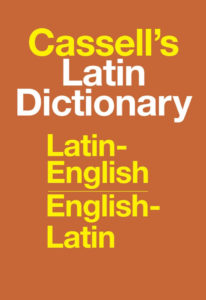Latin Third Experience = Intermediate Latin
Summer School
Online course: 22 July – 2 August 2024, weekdays
In Person course: 12 – 23 August 2024, weekdays
 Students entering this level will be expected to have a solid grasp of the topics covered in Beginning Latin. You will read a variety of original Latin texts, spanning many centuries, and write in Latin. We will cover:
Students entering this level will be expected to have a solid grasp of the topics covered in Beginning Latin. You will read a variety of original Latin texts, spanning many centuries, and write in Latin. We will cover:
- The meaning and uses of the subjunctive mood
- The forms and natural meanings of the four participles
- Various uses of participles including the ablative absolute
Intermediate Latin covers the material of the Third Latin Experience in Ossa Latinitatis Sola (read more here) also presented in the forthcoming book Ossa Ostensa Book 2.
This intermediate Latin course is suitable for people wanting to continue from the beginners’ course or for re-establishing a past knowledge of Latin. Both people studying for general interest and students preparing to sit a proficiency exam in liturgy or canon law will benefit from this course.
No vocabulary cards! No paradigms to memorize! Just the human, Latin language to understand, write and speak. Learn to pronounce and read Latin from original texts, both ancient, medieval and modern. Learn to compose your own sentences. Working patiently, we strive for a clear understanding of what the author originally said. No exam, just the enjoyment of learning the Latin language.
We use the teaching method of Reginald Foster OCD, retired papal Latinist of forty years, directly from his book Ossa Latinitatis Sola: The Mere Bones of Latin. This is also reflected in the new series by Laura Pooley, Ossa Ostensa, whose forthcoming Book 2 corresponds to this intermediate course.
Both courses, online and in person:
Hours: 3 hours with a break
Courses open to anyone 18 years of age or older.
Enrol and enquiries by contacting Clare Cogswell at this linked E-mail address.
Previous knowledge: The intermediate course presumes an understanding and use of the material presented in our Beginning Latin course and in the “First Experience” of Ossa Latinitatis Sola.
Aims: By the end of this course students will:
1. know the principles of the subjunctive mood of speaking in the Latin language
2. produce and work with the forms of the subjunctive in Latin
3. understand numerous uses of the subjunctive
4. render each subjunctive use accurately in English vernacular
5. recognize the sequence of tenses in Latin texts
6. produce the forms of the participles and their natural meaning in English
7. work with the ablative absolute and understand its relation to the whole sentence
Content: Students learn two main elements of Latin expression: the four participles and the subjunctive with their very many respective usages. The forms and natural meaning of the four participles are clearly presented along with their several usages especially in the ablative absolute. The principles of the subjunctive and their super-easy forms are presented along with their at times difficult to discern very many usages to express purpose, result, circumstance, cause, concession, characteristic. Relative expressions of each are also considered.
1) personal reading of the relevant encounters in the Ossa book,
2) shared encounter with Latin texts and Latin authors from many ages and
3) the ludi domestici (domestic games = self-study) completed privately and reviewed in common.
Books:
 ♦ SIMPSON, D.P. Cassell’s latin Dictionary, Macmillan, New York 1959 or equivalent, including a small English to Latin section. A pocket dictionary is not sufficient.
♦ SIMPSON, D.P. Cassell’s latin Dictionary, Macmillan, New York 1959 or equivalent, including a small English to Latin section. A pocket dictionary is not sufficient.
♦ FOSTER, R.T., – D.P. MCCARTHY, Ossa Latinitatis Sola ad mentem Reginaldi rationemque: The Mere Bones of Latin according to the thought and system of Reginald, (Latinitatis Corpus 1), Catholic University of America Press, Washington DC 2016. Available in October from the publisher or from Amazon.co.uk or from Amazon.com.
Recommended chapter:
FOSTER, R.T. – D.P. MCCARTHY, “Collectarum latinitas”, Appreciating the Collect: An Irenic Methodology (DREI, AL : LA 1), ed. J.G. Leachman – D.P. McCarthy, St. Michael’s Abbey Press, Farnborough, England 2008.Foster, R.T. – D.P. McCarthy, “Collectarum latinitas”, 27-56. Available from the publisher.
Canon Law Students at KU Leuven may take these summer courses or study Latin online throughout the academic term to prepare for two proficiency exams at KU Leuven.
Students for personal interest: There are no exams, just the enjoyment of learning Latin.
Enrol: Enquire and Enrol by contacting the Registrar at this linked E-mail address.
Contact: To schedule a visit write to the Registrar and Course Coordinator:
Clare Cogswell, Registrar
Benedictine Institute
74 Castlebar Road, Ealing, London W5 2DD, UK
enquiries: +44 (0)20 8194 2320
E-mail Clare, the Registrar at this linked E-mail address.
Location on Google Maps is found here.
Travel – Accommodation:
Limited accommodation is available in Ealing Abbey house for guests for students enrolled for both weeks.
© D. McCarthy, updated 22 December 2022 by DM.